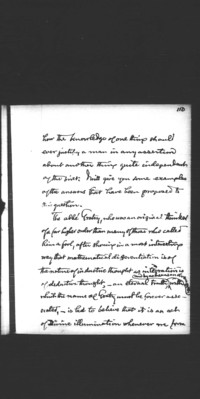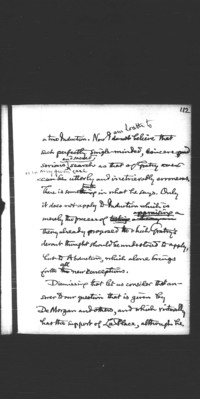Pages
56
106
but after all it made my mind easy about a number of possibilities that did not occur, and even about this one for three days. So I had better be content with my lot. This little parable is intended to illustrate how even the pooh-pooh argument, the weakest of all sound inductions, does satisfy the essential condition of saving me from surprises both positive and negative; that is from the happening of things not anticipated and the non-occurrence of imaginary disasters.
The argument from the fulfillment of predictions does still better. It may deceive one sometimes; but if I am constantly reasoning in this way, I shall get an early
57
108
warning of the danger of my theory's breaking down and can prepare myself for it. The argument from sampling simply evaluates a ratio. The value may be wrong. But that I know already, and the inductive process itself is continually correcting its own evaluation and goes on making it approximate indefinitely to the truth, which is all the process ever promised to do.
That, then, is my answer to the question, and it seems to me entirely satisfactory. But many other answers have been proposed by different writers. For it has always seemed to logicians to be a great
58
110
how the knowledge of one thing should ever justify a man in any assertion about another thing quite independent of the first. I will give you some examples of the answers that have been proposed to this question.
The abbé Gratry, who was an original thinker of a far higher order than many of those who called him a fool, after showing in a most interesting way that mathematical differentiation is of the nature of inductive thought as integration is of deductive thought,— an eternal truth, and by no means an obvious one, with which the name of Gratry must be forever associated,— is led to believe that it is an act of Divine illumination whenever we form
59
112
a true Induction. Now I am loath to believe that such perfectly single-minded, sincere, serious and sacred search as that of Gratry is in any given case utterly and irretrievably erroneous. There is some truth in what he says. Only it does not apply to Induction which is merely the process of appraising a theory already proposed to which Gratry's devout thought should be understood to apply, but to Abduction, which alone brings forth all new conceptions.
Dismissing that let us consider the answer to our question that is given by DeMorgan and others, and which virtually has the support of LaPlace, although he
60
114
did not formulate it in general terms. This answer is that we are justified in drawing an induction because the conclusion of an induction is rendered probable by the premisses, according to the doctrine of chances. This I deny, and maintain that the doctrine of chances, rightly applied, does not give any determinate probability to an inductive conclusion unless we make an assumption which really renders the reasoning deductive.
In order to show what sort of reasoning it is by which the Laplacians support their dogma, I will show you how they would calculate the probabilities in an example.




